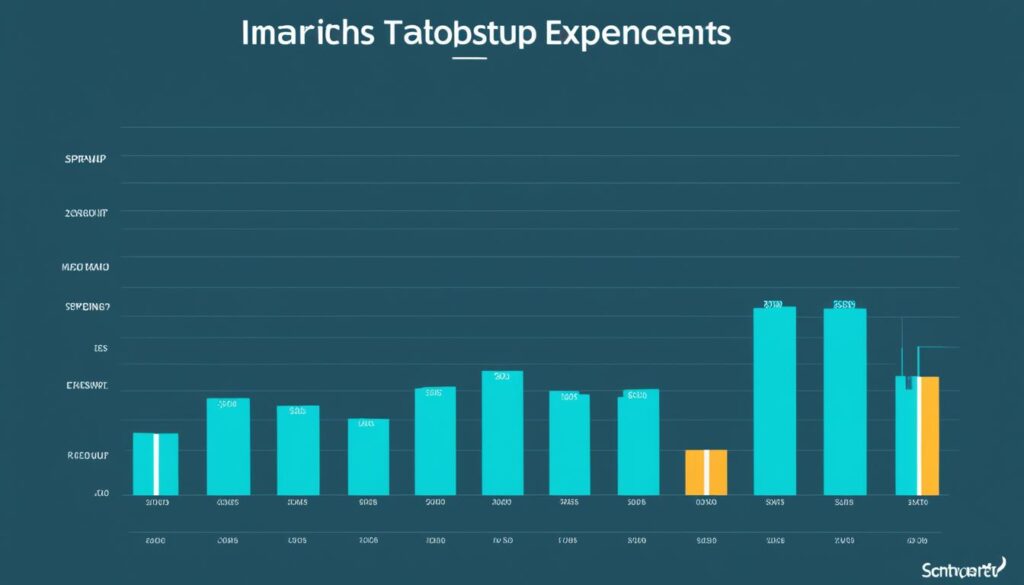Hyderabad , India
In the vibrant world of Indian startups, our journey is filled with passion, innovation, and a drive for success. Yet, managing our finances wisely is a big challenge. It’s about making sure every rupee is spent smartly and tracked well. Companies like Am Accountable offer virtual accounting services just for startups in India. They give us the tools to handle our finances better.
In just 24 hours, we can set up a virtual accounting team. This team helps us save time, cut costs, and manage expenses better. With the right support, managing expenses for Indian startups becomes easier. It helps us stay competitive in a fast-changing market.
Key Takeaways
- Effective expense management is crucial for the sustainability of Indian startups.
- Virtual accounting services help streamline financial processes and ensure timely decision-making.
- Understanding both fixed and variable expenses is essential for allocating resources accurately.
- Every startup needs to embrace technology to automate and optimize spending management.
- Proper expense tracking can significantly reduce costs and enhance operational efficiency.
Understanding the Importance of Expense Management
Effective expense management is key for startups to keep a healthy cash flow. It helps us understand our financial duties and make smart choices. By focusing on managing expenses, startups avoid spending too much and misusing resources. This careful planning keeps us on a path to sustainable growth.
Research by IDC shows that small and medium businesses in Asia Pacific worry about inflation and slow economic growth. In this tough time, having a solid financial plan is vital. For example, using expense management software can save businesses a lot of time and money. Spark MicroGrants found this out, saving 64 hours a month by using such a system in East Africa.
Expense management software helps spot unusual spending and improve tracking of expenses. For our community in India, tools like ExpenseOnDemand, SAP Concur, or Zoho Expense can make things much easier. These platforms offer real-time tracking, customizable approval steps, and support for different currencies. They meet the unique needs of businesses here and help with better financial planning.
Automation is key in the entrepreneurial world. By automating expense management, we cut down on time and costs for manual tasks. This lets us focus more on our main business goals. The growing market for expense management software in India shows a big trend towards better efficiency, especially for startups aiming to use their resources wisely.
The Role of Budgeting in Startup Success
Budgeting is key to a startup’s financial health. It helps us predict income and expenses, making a solid plan for using resources well. Even though 61% of startup owners don’t have a budget, having one is crucial for staying afloat.
Knowing about fixed costs and variable expenses gives us a clear picture of our finances. Experts advise saving enough cash for three months of expenses to be ready for unexpected financial issues.
Good cash flow management comes from realistic budgeting. Startups should plan for extra in areas like marketing and advertising. A study showed that 29% of startups failed because they ran out of money, highlighting how important budgeting is.
There are different ways to make a budget, like using a percentage of revenue or zero-based budgeting. To make a budget, we need to:
- Understand our finances.
- Set clear goals.
- Research and list expenses.
- Decide how to allocate the budget.
- Plan for unexpected costs.
A detailed budget helps us draw in investors, manage risks, and use resources well. It also lets us track our financial health, improve our market position, and grow over time.
For more tips on financial planning for Indian startups, check out this article. Also, look into free tools for budgeting and forecasting at this resource.
Expense Management for Indian Startups
Managing expenses well is key to the success of Indian startups. We must create a detailed budget and track our spending carefully. This helps us stay financially healthy, follow the law, and grow.
Creating a Detailed Budget
For a detailed budget, we list all income and expenses. This includes things like salaries, rent, and marketing. Checking our budget often lets us adjust spending and financial plans. This keeps us on track with our goals and follows tax rules.
Tracking and Monitoring Expenses
It’s vital to keep an eye on our finances. Using financial software to track expenses gives us clear insights. This helps us make better choices and promotes openness. Today’s automated tools make tracking and analyzing spending easier.
| Expense Category | Estimated Monthly Cost | Actual Monthly Cost | Status |
|---|---|---|---|
| Salaries | ₹500,000 | ₹480,000 | Under Budget |
| Rent | ₹100,000 | ₹100,000 | On Budget |
| Marketing | ₹200,000 | ₹250,000 | Over Budget |
| Miscellaneous | ₹50,000 | ₹30,000 | Under Budget |
This table shows our financial situation and helps us plan for the future. With these methods, we can handle our finances well. This lets us focus on growing and innovating.
Utilizing Expense Tracking Tools
In the competitive world of Indian startups, using expense tracking tools is key to better financial management. Moving to digital systems is now a must. These tools make budgeting easier and cut down on manual work.
Benefits of Digital Expense Management
Advanced expense tracking software brings many benefits:
- Increased efficiency: Startups can switch from manual to automated in under 30 minutes, saving time on manual entries.
- Real-time insights: We get real-time dashboards that show spending trends and patterns. This helps us make better cost decisions and use resources wisely.
- Error reduction: Automated systems check for errors, cutting down the time spent fixing mistakes.
- Fraud detection: They can spot duplicate transactions and stop fraud expenses.
- User-friendly interfaces: Quick setup means our teams can start using them fast, without needing a lot of training.
Popular Expense Tracking Software Options
Many expense tracking tools are popular among startups for their strong features:
| Expense Tracking Software | Key Features | Benefits |
|---|---|---|
| Zoho Expense | Autoscanning receipts, customizable workflows, tax automation | Reduces manual entry time, enhances communication |
| Expensify | Real-time reporting, online reimbursements, duplicate detection | Speeds up reimbursement process, decreases errors |
| QuickBooks | Integration with accounting systems, expense categorization | Streamlines financial reporting, improves visibility |
Optimizing Spending Through Spend Analytics
Start-ups need to grow in a tough market. Understanding and optimizing spending is key. Spend analytics helps us spot wasteful spending and where we can save. By using data smartly, we make better choices about how we use our resources. This keeps us on track with our goals.
Leveraging Data for Informed Decisions
Many Indian start-ups use Google Sheets for tracking expenses. But, sharing data can be hard. Creating many copies of the same spreadsheet leads to mistakes. Combining data makes our analysis clearer.
By organizing our data well, we get the insights we need. Adding expenses, setting reminders, and looking at spending patterns helps us manage better.
Strategies for Spend Optimization
We can improve our spending in several ways. These include:
- Conducting comprehensive supplier evaluations
- Negotiating better payment terms to manage cash flow effectively
- Using baseline measurements for continuous improvement
Automated systems help us keep an eye on our money in real-time. They show where we can save costs. This way, we avoid unauthorized spending and make paying easier.
| Strategy | Description | Benefits |
|---|---|---|
| Supplier Evaluations | Assessing suppliers for cost-effectiveness and reliability | Improved negotiation leverage and reduced costs |
| Payment Term Negotiation | Adjusting payment schedules to fit cash flow | Better cash flow management and reduced interest costs |
| Baseline Measurements | Setting benchmarks for expense categories | Continuous improvement and efficiency tracking |

Implementing Reimbursement Automation
Automating reimbursement processes is key to boosting efficiency. It helps streamline tasks that often slow down finance teams. By using financial technology, we make submitting expenses digital, cutting down processing time and errors.
With a strong automation system, we get instant updates on expenses. It comes with tools that analyze spending and trends, crucial for budget management. Auto-expense categorization makes tracking easier, simplifying financial reviews and ensuring policy compliance.
Our system uses OCR technology to read receipts, making data entry a thing of the past. This saves time and gives us detailed records for audits. It helps us follow financial rules and keep our processes clear.
Our automation supports complex approval workflows for Indian teams. It lets us approve many claims at once, boosting efficiency. Working with accounting systems like Netsuite, Xero, and Quickbooks makes our finances better. It shows why financial technology is vital for startups today.
Using AI in our automation takes our expense management to the next level. AI boosts accuracy, cuts down on mistakes, and helps follow rules better. These advances create a culture of responsibility and help manage risks well. So, automation not only makes our processes better but also helps our startups grow and compete.
Managing Travel and Entertainment Expenses
Travel and entertainment costs can really eat into our startup budgets. To keep these costs down, we need to focus on affordable travel options that fit our budget. By using smart strategies for managing travel and entertainment, we can make our budget go further and boost productivity.
Cost-effective Travel Solutions for Startups
To get the most out of our travel budget, we can try a few things:
- Book in advance: Booking early can lead to big savings.
- Opt for group rates: Traveling with a group can mean discounts.
- Utilize travel management apps: Tools like TripActions and TravelBank help track and manage costs.
Did you know the average business trip costs about $949? With smart management, we can get around $2.90 back for every dollar spent on travel. By keeping an eye on entertainment costs and making sure they match our business goals, we can build team spirit without wasting money.
Using the right tools is key. Platforms like Zoho Expense and TravelPerk have great features for tracking expenses and booking travel. Keeping our team updated on these tools helps us keep a closer eye on travel costs.
GST Compliance and Its Impact on Expenses
For Indian startups, sticking to the Goods and Services Tax (GST) rules is key. It affects how we manage our money. Since July 1, 2017, GST has replaced old taxes like VAT and Service Tax. This change means we need to understand GST rates well.
Being GST compliant means filing one return for all taxes. This can take more time and resources, especially for small businesses. We can’t get tax credits for things not used for business, which raises costs. Startups with higher tax rates might have more expenses, affecting cash flow.
Despite challenges, GST has helped the organized sector by bringing more businesses under tax rules. This makes things more transparent and accountable for startups. It also made moving goods faster, saving money on transport.
Many businesses, including us, are looking into outsourcing GST compliance. Working with experts helps us manage taxes better and avoid mistakes. This approach gives us flexibility and lets us focus on our main work while keeping up with taxes.
The table below shows key points about GST compliance and its impact on expenses:
| Aspect | Impact |
|---|---|
| GST Implementation Date | July 1, 2017 |
| Compliance Requirement | Single return for all taxes |
| Input Tax Credit | Not applicable for personal use |
| Tax Rates Range | 0% to 28% |
| Threshold for GST Registration | Exceeds ₹20 lakh turnover |
| Penalty for Non-compliance | ₹10,000 or tax evaded |
By keeping up with GST changes, we can work better and avoid tax problems. Understanding GST helps us manage our money and use our resources well.
Vendor Management to Reduce Costs
Effective vendor management is key to cutting costs for startups. By improving our vendor relationships, we can boost our financial health. Regular checks help us find the best vendors, building trust through clear communication.
With vendor management, we track delivery times, product quality, and satisfaction. This helps us negotiate better deals and keep an eye on our needs. Here are some ways focused vendor management can help:
| Focus Area | Benefit |
|---|---|
| Cost Savings | Efficient management leads to significant cost reductions through negotiations and bulk purchasing strategies. |
| Risk Mitigation | Planning for supply chain disruptions helps anticipate quality issues and delivery delays. |
| Quality Control | Monitoring vendors ensures high-quality products and services, boosting customer satisfaction. |
| Continuous Improvement | Collaborating with specialized vendors enhances our overall operational efficiency. |
| Brand Reputation | Selecting reliable vendors protects our brand image by ensuring quality deliverables. |
Our vendor management strategies help us negotiate better. By researching the market, we pick the right vendors. Clear talks during negotiations make sure we both know what to expect. This way, we cut down on costs and improve our startup’s finances.
Setting Up Corporate Cards for Simplified Payments
Corporate cards make managing money easier for startups. They help streamline simplified payments and make expense management tools more effective. They let us track spending well, making it clear and improving budget control.
To get corporate cards, businesses need good credit and a certain score. Companies making at least $4 million a year usually get them. Startups making less should look for cards made for small businesses. Small-business owners might need to promise personal responsibility when applying.
Corporate credit cards offer rewards and travel perks. They also help build a company’s credit score, making future financing easier. It’s important to manage them well. We suggest setting spending rules and training card users to use them right and report expenses on time.
Setting credit limits for cardholders by role can stop overspending. Giving employees add-on cards helps manage expenses better. Corporate cards give us zero-interest short-term credit, which helps startups a lot.
Corporate cards make managing rules and reports easier. When used right, they help with cash flow and lower fraud risk by watching spending. Companies can get cashback, making their finances healthier.
For businesses wanting more, options like the RazorpayX Corporate Card offer big benefits. They give up to 50 days of interest-free credit and dynamic credit limits. These features help us match our finances with our business needs. For more on managing finances, check out expense management for startups.
| Feature | Corporate Cards | Personal Cards |
|---|---|---|
| Credit Limit | Higher limits tailored for business | Lower limits based on personal credit |
| Rewards | Cashback and travel benefits | Limited rewards |
| Expense Tracking | Integrated tools for easy management | Manual tracking required |
| Impact on Credit Score | Improves business credit history | Impacts personal credit only |
Conclusion
Effective startup expense management is key for our Indian startups’ success. We focus on detailed budgets, digital tracking, and optimizing expenses. This approach boosts our financial stability and sets us up for long-term success.
By being proactive with compliance and managing vendors well, we stand out in the Indian market. This helps us stay competitive.
Our finance team is crucial for financial forecasting, risk management, and budgeting. These skills help us understand our performance, make smart decisions, and find fundraising chances. We hire skilled people and use technology to make our operations smooth. This supports our financial strategy.
At Am Accountable, we offer virtual accounting services for startups in India. We help you build a virtual accounting team in just 24 hours. This saves time and cuts costs, letting you focus on improving efficiency. For financial management help, contact us at +91 91778 42756.
FAQ
Why is expense management crucial for Indian startups?
Expense management keeps our cash flow healthy and helps us make better decisions. It ensures we don’t spend too much and keeps our money focused on our goals.
How can budgeting benefit our startup?
Budgeting gives us a clear plan for our money. It helps us predict our income and expenses. This way, we can manage our cash better, even when things change.
What types of expenses should we track regularly?
We should keep an eye on all our costs. This includes fixed costs like rent and salaries, and variable costs like marketing. Tracking expenses helps us see where our money goes.
What are the advantages of using digital expense management tools?
Digital tools make tracking expenses easy and give us real-time data. They help us make reports faster and cut down on mistakes. Tools like Zoho Expense and QuickBooks let us see our spending clearly.
How can spend analytics improve our spending habits?
With spend analytics, we can spot where we waste money and find ways to save. By looking at the data, we can make smarter choices about how we spend.
What steps can we take to automate reimbursement processes?
Using platforms for digital expense submissions makes getting reimbursed faster and easier. Automation cuts down on mistakes and makes things clearer, which helps our finances run better.
What should we consider when managing travel and entertainment expenses?
We should look for ways to save on travel, like booking early and using apps. Having clear rules for entertainment expenses helps us avoid spending too much while still building our team.
Why is GST compliance important for our startup?
Following GST rules is key for our finances and cash flow. Knowing the GST rates and keeping accurate records lets us claim back tax credits and avoid fines.
How can effective vendor management reduce our costs?
Checking in on our vendors and negotiating with them can lower our costs. Setting clear goals helps us buy better and manage our money better.
What are the benefits of implementing corporate cards in our startup?
Corporate cards make paying easier and help us track expenses better. They often come with tools for managing expenses, which helps us keep an eye on our spending and stick to our budget.








